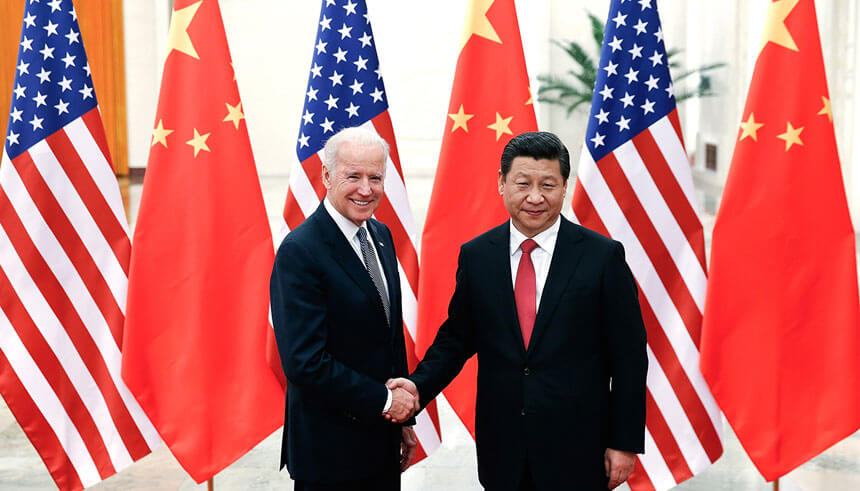US-Asia Business
US-China Market Watch: Biden-Xi Summit, Didi to Delist from NYSE, US Invests in Chips
By Angela Bao

Your monthly roundup of the latest US-China business and industry news.
Biden-Xi hold virtual summit to discuss bilateral cooperation
After three and a half hours of virtual talks, President Biden and Chinese President Xi Jinping both pledged further cooperation on bilateral relations, but neither side offered concrete steps. In separate statements, both sides reiterated the issues they found most pressing: the U.S. raised concerns about China’s alleged human rights abuses and trade practices, while China remarked on the United States’ perceived alignment with Taiwan as divisive.
During the call, President Biden recognized Beijing’s “one-China” policy, under which the U.S. does not recognize Taiwan as a separate state from mainland China. However, two bipartisan Congressional delegations visited Taiwan in November to demonstrate “unified, resolute support for Taiwan-U.S. relations.” The decision to align further with the island comes as the U.S. tries to shore up support against China’s increasing influence in the Indo-Pacific region.
China makes digital yuan more connected
According to the People’s Bank of China (PBOC), China will push to make the digital yuan more connected with mobile payment apps to “improve the e-CNY ecosystem” (e-CNY is the official name of the digital yuan). The PBOC will also develop a management model for the e-CNY based on how cash and bank accounts are managed, and improve efficiency, privacy, and anti-counterfeiting functions.
China has been piloting its digital currency since late 2020 and is one of the forerunners in developing digital currency. According to a central bank official, 140 million people had opened “wallets” for the e-CNY and have used it for transactions totaling about $9.7 billion.
Didi Global to delist from NYSE
Chinese regulators are reportedly asking rideshare company Didi Global to delist from the New York Stock Exchange (NYSE) due to national security concerns over sensitive data (Didi operates China’s largest ride-hailing app). According to Bloomberg, the Cyberspace Administration of China asked Didi executives to formulate a delisting plan that is subject to government approval. Didi announced via Weibo in early December that it planned to start delisting “immediately” from the NYSE and begin preparations for listing in Hong Kong.
Didi had pushed ahead with its initial public offering on the NYSE in June, reportedly without resolving cybersecurity issues regulators had raised. Shortly after Didi’s IPO, Beijing opened a cybersecurity review on the company, amid a crackdown on the country’s domestic tech giants. Bloomberg posits that such a precedent could potentially lead to the government requiring other tech companies that handle sensitive data and have long-standing overseas listings, such as Alibaba and JD.com, to delist. However, Bloomberg says, it’s most likely that currently unlisted companies hoping to list in the U.S. will not be able to do so.
Didi aside, a Chinese regulatory official says that they are working with U.S. authorities to prevent Chinese companies from being delisted on U.S. stock exchanges. Back in December 2020, then-President Donald Trump had signed into law the Holding Foreign Companies Accountable Act, which is aimed at removing Chinese companies from stock exchanges if they fail to comply with U.S. auditing standards.
U.S. to increase investment in chip and semiconductor manufacturing
A global chip shortage has spurred a boost in investment in semiconductor manufacturing both in the United States and worldwide. Some of the world’s leading chip manufacturers such as Intel, South Korea’s Samsung, and Taiwan Semiconductor Manufacturing have invested in U.S. production. The House is also being pushed to pass legislation that would provide $52 billion in direct subsidies for chip factories. The Senate passed the bill in June 2021.
Currently, the U.S. accounts for about 12% to 13% of global semiconductor production, despite U.S. companies representing about half of the $464 billion semiconductor industry. Taiwan, China, South Korea, and Japan account for about three-quarters of semiconductor production.
The Biden administration welcomed Samsung’s investment in Texas and has stated that it is working with Congress, allies, and partners to boost U.S. manufacturing capacity. Part of that could be attributed to a Wall Street Journal investigation that found out that U.S. firms had been ramping up investment in the Chinese semiconductor industry from 2017 to 2020, just as the race for chip dominance heats up between the U.S. and China.
The future of Hollywood remains in flux in China
Another Hollywood blockbuster, Sony’s “Venom: Let There Be Carnage,” is still waiting to hear about a release date in China. The lack of news around a potential release date could stem from star Tom Hardy’s previous remarks about China, which were seen as offensive and “insulting” by hundreds of people on Chinese forums.
However, “The Matrix Resurrections,” the upcoming fourth installment of the Keanu Reeves-led Matrix franchise, has been approved for release in China, although a specific release date has yet to be set. There is also speculation that “Spider-Man: No Way Home,” is likely to be approved for Chinese release, which would make it the first Phase Four Marvel film to open in the mainland.
The China Film Administration outlined its 14th Five-Year Plan for the development of Chinese movies, which includes increasing the number of screens in the country to 100,000 by 2025, promoting 10 domestic tentpole films each year, and becoming a “strong film power” by 2035.
Sign up for the Reach Further Newsletter
We’ll keep you in the know about the latest US-Asia business news and trends.
Suscríbase al boletín Reach Further
Lo mantendremos informado sobre las últimas noticias y tendencias comerciales entre Estados Unidos y China.

